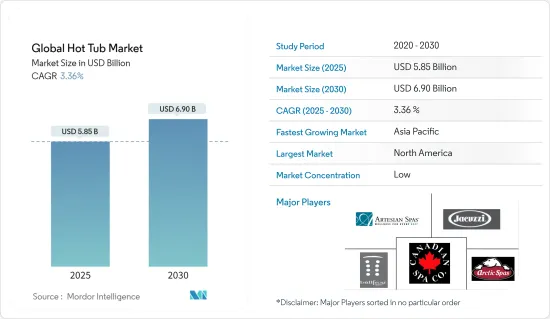
|
市場調査レポート
商品コード
1687883
ホットタブ:世界の市場シェア分析、産業動向・統計、成長予測(2025年~2030年)Global Hot Tub - Market Share Analysis, Industry Trends & Statistics, Growth Forecasts (2025 - 2030) |
||||||
カスタマイズ可能
適宜更新あり
|
|||||||
| ホットタブ:世界の市場シェア分析、産業動向・統計、成長予測(2025年~2030年) |
|
出版日: 2025年03月18日
発行: Mordor Intelligence
ページ情報: 英文 130 Pages
納期: 2~3営業日
|
全表示
- 概要
- 目次
世界のホットタブ市場規模は2025年に58億5,000万米ドルと推計され、予測期間(2025-2030年)のCAGRは3.36%で、2030年には69億米ドルに達すると予測されています。

一般に、ホットタブは木材、セメント、ステンレス鋼、ガラス繊維でできており、さまざまな健康上の利点をもたらします。これには、ストレスからの解放、関節炎の痛みの最小化、糖尿病性血糖値の低下、血圧の低下などが含まれます。
COVID-19の発生は世界中で景気減速を引き起こしています。ホットタブ市場は広く高級品セクターの一部と見なされているため、市場は景気サイクルに非常に敏感です。世界の景気後退は、こうした製品、特に市場の高級品・プレミアム分野への需要を著しく阻害しています。多くの政府や保健機関が旅行を控えるよう勧告しており、休暇中の旅行にはまだ制限があります。市場セグメンテーションの主な予防法は物理的な距離を置くことであるため、多くのウェルネスセンター、高級ホテル、スパ、スポーツジムが人との接触を減らすために閉鎖されているため、市場の商業セグメントで暴落が起きています。高級品に関する消費者行動の一時的な変化が予測されるが、それは短期間で終わる可能性があり、景気が回復し始めると、消費者の関心が高まり、製品に対する需要が増加する可能性があります。
可処分所得の増加、健康に対する意識の高まり、個人のライフスタイルの変化、急速な技術の進歩は、ホットタブ市場を牽引すると予想される主な要因の一部です。メーカーは、エネルギー効率の高い機能を備えた革新的なホットタブの発売に注力しています。
ホットタブの多機能性は、長方形のホットタブと比較して、水泳やワークアウトのためのより広いスペースを提供するため、ホットタブ市場を後押しすると予想されるもう一つの要因です。このような特徴も、世界中でソーラーホットタブの需要を促進しています。
急速な都市化も予測期間中にホットタブ市場を牽引すると予想されます。しかし、原材料価格の変動は予測期間中の市場成長を妨げる可能性が高いです。
ホットタブ市場の動向
商業用エンドユーザーセグメントが高い成長率を予測
エンドユーザーに基づき、ホットタブ市場は住宅用と商業用に分けられます。商業用セグメントには、ホテル、スパ、サロン、その他の商業用エンドユーザーが含まれます。エンドユーザー区分では、予測期間中、業務用区分の成長率が高いと予想されます。ホテルやサロン、スパ業界の急成長は、予測期間中にホットタブ市場を加速させると予想される主な要因です。
アジア太平洋が最も高い成長を遂げる見込み
地域別に見ると、ホットタブ市場はアジア太平洋、欧州、北米、中東・アフリカ、ラテンアメリカに分けられます。予測期間中、アジア太平洋が市場の急成長地域となり、次いで欧州、北米が続くと予想されます。
同地域、特に中国とインドにおける都市化の進展と消費者の購買力の上昇が、同地域の市場成長を牽引すると予想されます。この成長を後押しする主な要因の1つは、住宅および商業分野への投資の増加です。
ホットタブ産業の概要
本レポートでは、ホットタブ市場で事業を展開する主要な国際企業を取り上げています。市場シェアの面では、現在少数の大手企業が市場を独占しています。しかし、需要は消費者の所得によって左右されます。大手企業は、大量仕入れ、幅広い製品、効果的なマーチャンダイジングとマーケティングで競争しています。小規模企業は、市場セグメントに焦点を当て、製品の充実度と優れた顧客サービスによって競争しています。
その他の特典:
- エクセル形式の市場予測(ME)シート
- 3ヶ月間のアナリスト・サポート
目次
第1章 イントロダクション
- 調査の前提条件と市場定義
- 調査範囲
第2章 調査手法
第3章 エグゼクティブサマリー
第4章 市場の洞察と力学
- 市場概要
- 促進要因
- 抑制要因
- 機会
- ホットタブ市場に影響を与える動向
- ポーターのファイブフォース分析
- ホットタブ市場のサプライチェーン/バリューチェーン分析
- 技術革新
- COVID-19の市場への影響
第5章 市場セグメンテーション
- タイプ
- ポータブルホットタブ
- 固定式ホットタブ
- エンドユーザー
- 住宅
- 商業
- 地域
- 北米
- 欧州
- アジア太平洋
- ラテンアメリカ
- 中東・アフリカ
第6章 競合情勢
- 企業プロファイル
- Bullfrog Spas
- Canadian Spa Company
- Jacuzzi Brands
- Artesian Spas
- Blue Falls Manufacturing
- Cal Spas
- Nordic Hot Tubs
- Coast Hot Tubs
- Caldera Spas
- PDC Spas
- その他の企業(Beachcomber、Viking Spas、Catalina Spas、Master Spas and Hot Tubs、Atera Anytemp、Maax Spas、Marquis Spas、Dynasty Spas)
第7章 市場の将来
第8章 免責事項
The Global Hot Tub Market size is estimated at USD 5.85 billion in 2025, and is expected to reach USD 6.90 billion by 2030, at a CAGR of 3.36% during the forecast period (2025-2030).

Generally, hot tubs are made of wood, cement, stainless steel, and glass fiber, and they provide various health benefits. These include relief from stress, minimization of arthritis pain, reduction of diabetic blood sugar levels, and lowering of blood pressure.
The COVID-19 outbreak has been causing an economic slowdown all over the world. As the hot tub market is widely considered a part of the luxury goods sector, the market is highly sensitive to economic cycles. The economic recession worldwide has seriously hampered the demand for these products, especially the high- and premium segments of the market. Many governments and health organizations are suggesting not to travel and as there are still restrictions on holiday travel. There is crashing in the commercial segment of the market as many wellness centers, luxury hotels, spas, and gymnasiums are closed to reduce human contact, as the main prevention for COVID-19 is physical distancing. A temporary shift in consumer behavior in terms of luxury products is forecasted but it may last for a shorter period, and once the economy starts to bounce back, the demand for the products may increase with gaining consumer interests.
Rise in disposable income, an increase in awareness about health, changing lifestyles of individuals, and rapid technological advancements are some of the major factors expected to drive the hot tub market. Manufacturers are focusing on launching innovative hot tubs with energy-efficient features.
The multi-functionality of hot tubs is another factor anticipated to boost the hot tub market as multi-functional hot tubs provide more space for swimming and workout compared to rectangular hot tubs. These features are also propelling the demand for solar hot tubs across the world.
Rapid urbanization is also anticipated to drive the hot tub market during the forecast period. However, fluctuations in prices of raw materials are likely to hamper the market growth during the forecast period.
Hot Tub Market Trends
The Commercial End User Segment is Anticipated to Grow at a Higher Rate
Based on end-users, the hot tub market can be divided into residential and commercial. The commercial segment includes hotels, spas and salons, and other commercial end-users. Under the end-user segments, the commercial segment is expected to grow at a faster rate during the forecast period. The rapid growth in the hotel and salon and spa industry is the key factor expected to accelerate the hot tub market during the forecast period.
Asia-Pacific is Expected to Witness the Highest Growth
By geography, the hot tub market is divided into Asia-Pacific, Europe, North America, Middle-East and Africa, and Latin America. Asia-Pacific is anticipated to be the rapidly growing region of the market, followed by Europe and North America, during the forecast period.
The growing urbanization and rising purchasing power of consumers in the region, especially from China and India, are expected to drive the growth of the market in the region. One of the key factors boosting this growth is the increasing investments in the residential and commercial sectors.
Hot Tub Industry Overview
The report covers the major international players operating in the hot tub market. In terms of market share, few of the major players currently dominate the market. However, the demand is driven by consumer income. Large companies compete through volume purchasing, breadth of products, and effective merchandising and marketing. Small companies focus on a market segment and compete through the depth of products and superior customer service.
Additional Benefits:
- The market estimate (ME) sheet in Excel format
- 3 months of analyst support
TABLE OF CONTENTS
1 INTRODUCTION
- 1.1 Study Assumptions and Market Definition
- 1.2 Scope of the Study
2 RESEARCH METHODOLOGY
3 EXECUTIVE SUMMARY
4 MARKET INSIGHTS AND DYNAMICS
- 4.1 Market Overview
- 4.2 Drivers
- 4.3 Restraints
- 4.4 Opportunities
- 4.5 Trends Influencing the Hot Tub Market
- 4.6 Porter's Five Forces Analysis
- 4.7 Supply Chain/Value Chain Analysis of the Hot Tub Market
- 4.8 Technological Innovations
- 4.9 Impact of COVID-19 on the Market
5 MARKET SEGMENTATION
- 5.1 Type
- 5.1.1 Portable Hot Tubs
- 5.1.2 Fixed Hot Tubs
- 5.2 End User
- 5.2.1 Residential
- 5.2.2 Commercial
- 5.3 Geography
- 5.3.1 North America
- 5.3.2 Europe
- 5.3.3 Asia-Pacific
- 5.3.4 Latin America
- 5.3.5 Middle-East and Africa
6 COMPETITIVE LANDSCAPE
- 6.1 Company Profiles
- 6.1.1 Bullfrog Spas
- 6.1.2 Canadian Spa Company
- 6.1.3 Jacuzzi Brands
- 6.1.4 Artesian Spas
- 6.1.5 Blue Falls Manufacturing
- 6.1.6 Cal Spas
- 6.1.7 Nordic Hot Tubs
- 6.1.8 Coast Hot Tubs
- 6.1.9 Caldera Spas
- 6.1.10 PDC Spas
- 6.1.11 Other Companies (Beachcomber, Viking Spas, Catalina Spas, Master Spas and Hot Tubs, Atera Anytemp, Maax Spas, Marquis Spas, and Dynasty Spas)


